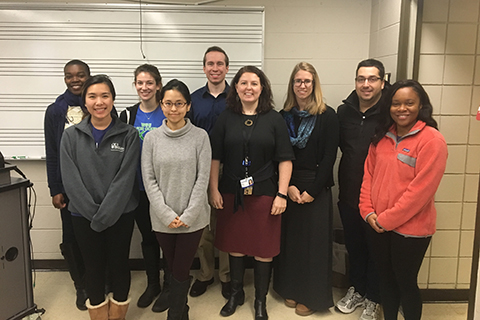
In 2015, Dean Folberg and David DiChiera, founder of the Michigan Opera Theater (MOT), brought cast members of The Passenger, an opera in rotation at MOT, to OUWB for a scaled down miniature-performance. At the time, they were unaware that this performance would spark a long-lasting partnership between MOT and OUWB and an innovative new course for OUWB students.
This semester, taught by Assistant Professor Amy DeBaets, Ph.D., OUWB offered its first Medicine at the Opera course, where students analyze three operas spanning different centuries and genres: Mozart’s 18th century comedy Don Giovanni, a live performance of Verdi’s 19th century tragedy Rigoletto and 21st century Dr. Atomic by contemporary composer John Adams.
After viewing each opera, the class discusses the dynamics of each scene, the lyrics and music, the staging, costumes, lighting and more. Interspersed throughout the course, DeBaets plays videos of clinical patient encounters and encourages students to pay similar attention to the details.
“What we’re doing within this particular course is utilizing the medium of opera to improve students’ observational skills in complex clinical settings,” DeBaets explains. “While looking at a piece of art and looking at an MRI scan are more closely related, looking at something that’s really complex like an opera scene and looking at the dynamics of a particular patient clinical encounter are more appropriately correlated,” she says.
In addition to observational skills, DeBaets, who teaches bioethics, hopes that this unique crossover will spark conversation about a theme common in both medicine and opera: ethical decision-making.
“One of the things that differentiates opera from other dramatic media is that composers don’t write an opera unless the plot involves life and death stakes,” DeBaets says. “In clinical medicine, the stakes are typically life and death in some way.” Therefore, she incorporates questions about the main characters, their motives and their justifications for making certain decisions during the post-performance discussions.
With ethical, informed decisions being so crucial, communication is a key component in the medical field. DeBaets believes that exposure to music and theater may be the creative outlet students need. The use of visual media in a medical curriculum is not unheard of; in fact, the benefits of using static visual media in teaching clinical observational skills is common in medical education literature. However, DeBaets has never encountered literature exploring the use of dynamic art, such as opera.
“In medicine, creativity still does matter,” she says. “Not so much in terms of what treatment you make for whom, but in terms of how we develop our communication skills.” She believes that, if physicians are able to constructively relate to each patient, coworker and family member, fewer communication breakdowns will occur, and there will be fewer occasions in which ethics and decisions are called into question.
“I think if we can teach people to be better communicators and better readers of the situations they’re walking into, we can avoid a lot of those problems proactively,” she says.
DeBaets applies her passion for music and theater to create program
DeBaets is thrilled to bring together the worlds of opera and medicine, as her background is a unique melding of the two. Her mother, a music teacher of 40 years, brought music into her home, and her undergraduate degree was in theater. “I don’t get to use my theater degree a lot,” she explains. “It’s fun to be able to draw on this part of my background.” Some of her students, too, have impressive musical backgrounds, while others have little experience with the arts. “It’s nice to draw on the insights of each person, because we all bring something different to the table, yet all have an interest in clinical medicine and ethics.”
Last summer, DeBaets presented this information at the Cambridge Consortium for Bioethics Education in Paris. Attendees watched a scene from Kevin Puts’ 21st century opera Silent Night and had a discussion afterward, not unlike a discussion that might be held in the Medicine at the Opera course. “There was a lot of enthusiasm among the bioethics educators, because they hadn’t seen anything like this before,” DeBaets says. “Many of the people in attendance were opera fans themselves and said, ‘I never thought to use opera in a medical school course.’”
Due to its success this semester, the Medicine at the Opera course will be offered again next year. DeBaets hopes to eventually develop this as a program through which physicians can continue their medical education.
She explains: “They’ll be able to attend an opera and then utilize this aspect of post-performance reflection to train them to better utilize their observational skills, as well.”

